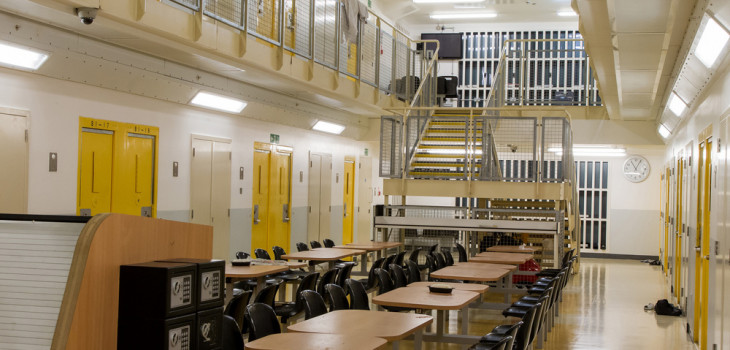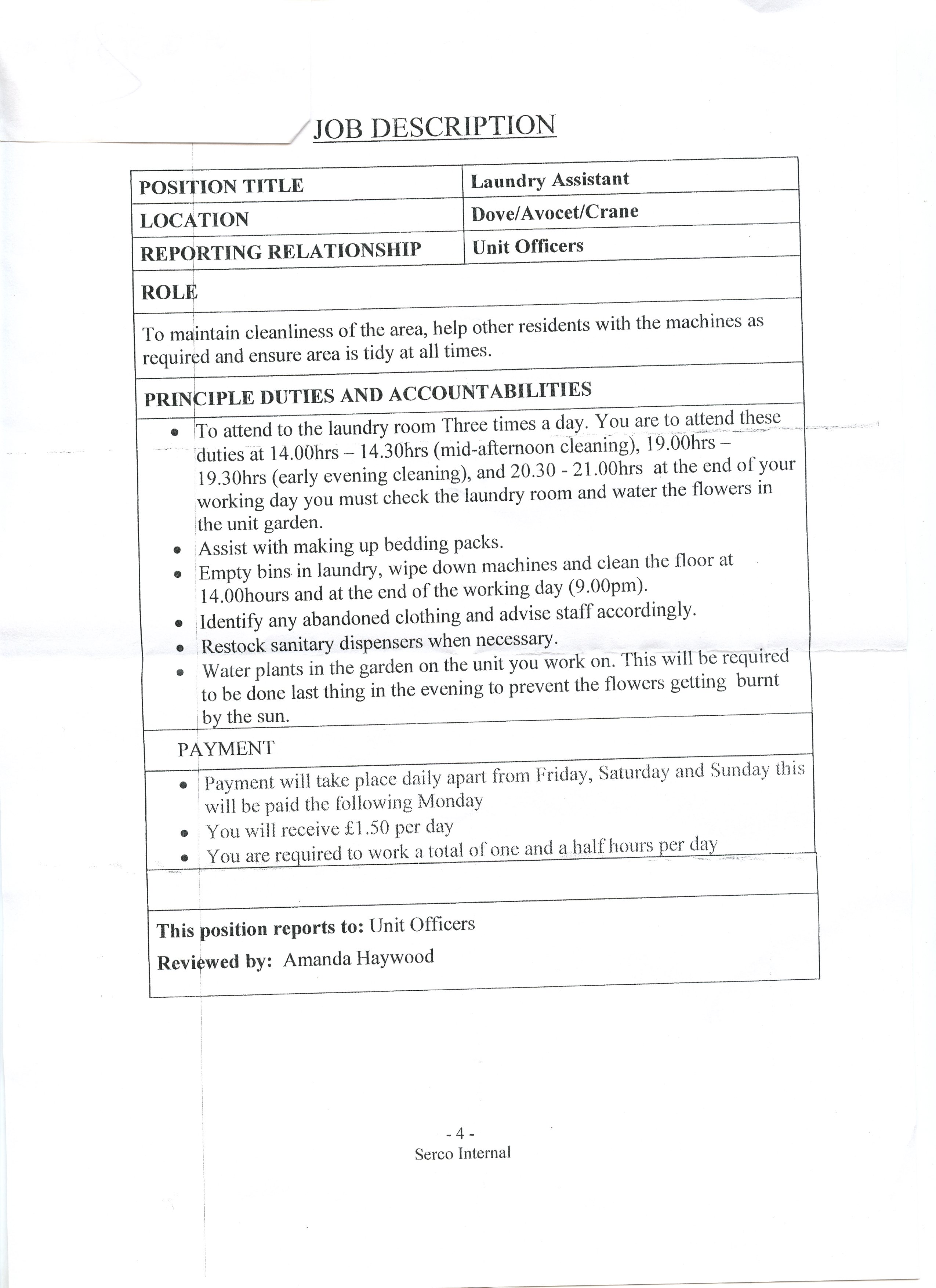True scale of captive migrant labour revealed

[responsivevoice_button]
Companies are potentially saving millions by paying asylum-seekers just £1 an hour to do essential jobs inside their detention centres, an investigation by Corporate Watch has found.
G4S, Serco, GEO and Mitie, which hold large government contracts to run immigration detention centres across the UK, paid hundreds of detainees a total of £45,438 for working 44,832 hours – the equivalent of 6,000 working days – in May 2014, according to disclosures under the Freedom of Information Act. The majority of detainees were only paid £1 an hour, with some paid £1.25 for certain jobs.
Detainees interviewed by Corporate Watch say the work includes cooking, cleaning and other jobs such as building maintenance that are all necessary for operating the detention centres. The cost to the companies of paying workers the £6.31 minimum wage for an equivalent amount of work in that month would have been more than a quarter of millions pounds. Over the course of a year, this difference could amount to nearly £3m more than the companies paid the asylum-seekers.
The largest employer of detained migrants is GEO, an American company that Corporate Watch estimates could be saving nearly £1.5m annually by not paying detainees the minimum wage. This is equivalent to more than a third of GEO’s gross profit from its UK detention centres. The company even employs some detainees for night shift work, including cleaning the floors with power tools while the rest of the centre is locked up.
Phil Miller speaking about asylum seekers working in detention centres from Standoff Films on Vimeo.
People in UK immigration removal centres are held under administrative detention powers, meaning they are not serving a criminal sentence. Instead they are waiting for their immigration and asylum cases to be decided. Asylum-seekers are not normally allowed to work outside of detention.
Although detainees are not forced to work in the centres, many of them say they need the job to afford essential toiletries, food and phone calls to lawyers. One detainee told Corporate Watch he was paid £17 per week for serving breakfast, lunch and dinner at the canteen in Harmondsworth from Sunday afternoons to Wednesdays. He asked: “do they think we just got off a slave ship?”.
Security giant G4S employed asylum-seekers in its two detention centres for 10,067 hours during May 2014, paying them £10,192. Paying staff the minimum wage for that month would have cost £63,523. Over the course of a year, that potential saving could amount to almost £640,000.
Mitie paid detainees £2,948 for 2,948 hours in May 2014. One detainee told Corporate Watch he was paid just £15 per week for 12 hours work preparing bedding packs at the company’s Campsfield centre.
Serco’s detainees worked 9,311 hours in a month and were paid just £9,311. A leaked job description shows Serco hired a detainee to “restock sanitary dispensers” and “clean the floor” at the notorious Yarl’s Wood site. Serco told Corporate Watch it “refutes the implication that we have used residents to conduct work in place of officers at any of the IRCs [Immigration Removal Centres] that we manage and operate and thereby made a profit.”
Employment lawyers told Corporate Watch the scheme is open to challenge on several fronts. The Home Office responded to our investigation saying “The long-standing practice of offering paid work to detainees has been praised by Her Majesty’s Inspectorate of Prisons as it helps to keep them occupied whilst their removal is being arranged. Whether or not they wish to participate is entirely up to the detainees themselves. This practice is not intended to substitute the work of trained staff.”
Corporate Watch is continuing our investigation, so if you have any information to share please get in touch. Email contact[at]corporatewatch.org or call 0207 426 0005. Filmmakers at Stand Off Films are looking to interview ex-detainees who worked in detention. Email standoffilms[at]gmail.com or call 07901 306 946.
* * *
As the government cracks down on undocumented workers and forces employers to check their staff’s immigration status, we have found that over 900 migrants are working for as little as £1 per hour in detention centres where they are held after immigration raids or asylum interviews. By contrast, the Home Office issued 1,270 fines to employers of illegal migrant workers last year.
The Corporate Watch investigation has found that the most prolific employer of detainee labour is GEO. A subsidiary of this American prison company runs two detention centres in the UK: Harmondsworth, outside Heathrow Airport, the largest site in the country with 661 beds, and the smaller 217-bed Dungavel centre in Scotland. GEO’s detainees worked 22,506 hours in May 2014, according to management data obtained by Corporate Watch. They received £22,987 in pay.
 Based on the data for that month, we estimate that GEO could have saved nearly £1.5m last year by not paying the minimum wage for this work. The latest set of accounts for GEO Group UK showed a gross profit – described as a “key performance indicator” – of almost £4m. So the wages potentially saved by using detainee labour is equivalent to more than a third of GEO’s gross profit for its UK detention business.
Based on the data for that month, we estimate that GEO could have saved nearly £1.5m last year by not paying the minimum wage for this work. The latest set of accounts for GEO Group UK showed a gross profit – described as a “key performance indicator” – of almost £4m. So the wages potentially saved by using detainee labour is equivalent to more than a third of GEO’s gross profit for its UK detention business.
One detainee, who like all those we spoke to wishes to remain anonymous, told Corporate Watch he works as a decorator at Harmondsworth and paints the walls from 10.30am to 5pm, Mondays to Saturdays. He is paid just £6 per day. He said the job keeps him busy and is “something to do”.
Other detainees told us that some are employed at Harmondsworth to work a night shift from 10pm to 1am, cleaning the centre while the other detainees are locked in their cells. GEO told us that “Detainees at Harmondsworth do not routinely or regularly work night shifts. Now and again a few detainees, who choose to do this work, will be employed at night to buff floors in public areas using power tools. This is for a few hours only and not throughout the night. This is done when other detainees are in their rooms so the work is not interrupted by people walking on the floors as they are being buffed. This is the only work in the evenings at Harmondsworth and there is none at Dungavel.”
 Security giant G4S runs two UK detention sites (Brook House and Tinsley House) next to Gatwick Airport. Detainees worked 10,067 hours in May 2014. They were paid £10,192. We estimate that G4S would have paid £640,000 more each year if it had to pay the minimum wage for this work.
Security giant G4S runs two UK detention sites (Brook House and Tinsley House) next to Gatwick Airport. Detainees worked 10,067 hours in May 2014. They were paid £10,192. We estimate that G4S would have paid £640,000 more each year if it had to pay the minimum wage for this work.
G4S refused to comment on these figures, saying that it was “commercially sensitive information”, but insisted the company worked in accordance with Home Office rules. G4S said “the Detention Services Order for the provision of paid work opportunities provides the standard to which we must comply, including pay rates”.
David Goggin from Home Office Immigration Enforcement explained that “Detainees are exempt from the provisions of the minimum wage by way of Section 59 of the Immigration, Asylum and Nationality Act 2006. There are two tiers of pay: 1) routine work will be paid at a rate of £1.00 per hour, 2) specified projects (as authorised by the Home Office Centre Manager) will be paid at a rate of £1.25 per hour.”
G4S has outsourced the canteen at Brook House to catering company Aramark, which is allowed to use the detainees to prepare meals for the centre. Aramark declined to comment. G4S runs a similar scheme in its prisons, offering “a committed workforce and low overheads” to firms that set up shop inside. The inmates manufacture furniture and even run a call centre.
Detainees in Serco’s notorious Yarl’s Wood women’s centre and the high-security Colnbrook site are also hard at work. A leaked job description from Yarl’s Wood confirmed that a detainee was being employed as a laundry assistant “to maintain the cleanliness of the area, help other residents [sic] with the machines as required and ensure area is tidy at all times”. The worker had to “empty bins in laundry, wipe down machines and clean the floor”. The job was to be done in three 30 minute shifts each day. “You will receive £1.50 per day”, Serco’s job description states.
A Serco spokesperson told Corporate Watch: “the practice of paid work is not intended to substitute the work of trained staff and therefore the suggestion that this saves Serco money and that Serco is profiting from this is factually incorrect and not true.” But several former detainees we spoke to insisted that their jobs did replace the work of Serco officers.

In September 2012, women detained in Yarl’s Wood organised a “Movement for Justice” group and voted on a set of demands for an immediate improvement to conditions at Yarl’s Wood. Those demands included: “Pay us at least the minimum wage for the work we do in detention”. The members refused to go to work and were reportedly sacked by the management for protesting.
 Screenshot from Yarl’s Wood website
Screenshot from Yarl’s Wood website
The number of detainees employed at Yarl’s Wood appears to have fallen since then. Prison Inspector Nick Hardwick said last year “The amount of paid work at the centre had reduced since the previous inspection, to approximately 50 places.”
 Mitie is a well known employer of cleaners and facilities maintenance staff. But at its Campsfield detention centre outside Oxford, it was the detainees that did many of those jobs for the company, clocking up 2,948 hours in May 2014, and receiving just £2,948. One detainee who prepared bedding packs at Campsfield said he was paid £15 per week for 12 hours work. Mitie is taking over the Harmondsworth and Colnbrook centres at the end of August 2014.
Mitie is a well known employer of cleaners and facilities maintenance staff. But at its Campsfield detention centre outside Oxford, it was the detainees that did many of those jobs for the company, clocking up 2,948 hours in May 2014, and receiving just £2,948. One detainee who prepared bedding packs at Campsfield said he was paid £15 per week for 12 hours work. Mitie is taking over the Harmondsworth and Colnbrook centres at the end of August 2014.
Francesca Litchfield, Business Development Manager for Mitie’s Care and Custody division that runs Campsfield, told us Mitie cannot comment directly because it had to refer all media enquiries to the Home Office, “as agreed as part of our client relationship”.
A Home Office spokesperson responded to Corporate Watch, on behalf of all the contractors, and said: “The long-standing practice of offering paid work to detainees has been praised by Her Majesty’s Inspectorate of Prisons as it helps to keep them occupied whilst their removal is being arranged. Whether or not they wish to participate is entirely up to the detainees themselves. This practice is not intended to substitute the work of trained staff.”
However, Nick Hardwick, the Chief Inspector of Prisons, has made strong criticisms of the scheme, particularly the fact that all recruitment is vetted by the Home Office before any of the contractors can employ a detainee. Hardwick has consistently recommended that this vetting practice should cease. At Harmondsworth, he found that the “recruitment processes enabled the Home Office to veto individual applications for work for reasons of non-compliance, which amounted to inappropriate interference in the centre’s ability to manage the population.” His recommendation is repeated in all his detention centre inspection reports: “Detainees’ cooperation or failure to cooperate with the Home Office should not affect their ability to work.” At Yarl’s Wood, Her Majesty’s Inspectorate of Prisons found, “much of the work was mundane, presenting little challenge and not offering suitable opportunities to those detained for long periods to develop their skills”.
Although detainees are not forced to work, many of them say they need the job to afford essential toiletries, food and phone calls to lawyers. One detainee told Corporate Watch he was paid £17 per week for serving breakfast, lunch and dinner at the canteen in Harmondsworth from Sunday afternoons to Wednesdays. He asked “do they think we just got off a slave ship?” In an echo of the ‘sharecropping’ system, where newly-freed slave farmers in the southern states of America had to pay the landowner a share of their harvest, detainees get paid in the form of electronic credits that can only be spent at a shop inside the centre that is run by the same company that employs and detains them.
Employment lawyers told Corporate Watch that the scheme is open to challenge on several fronts. Solicitors warned that the lack of holiday pay or a pension scheme are employment rights that were not ruled out under the Immigration, Asylum and Nationality Act 2006, so detainees may still be eligible for them. Another issue is sacking detainees for conduct not related to their work – the Home Office’s own guidance says this can include resisting a deportation attempt.
A handful of detention centres are run by the Prison Service rather than private companies. Our data shows the state-run centres also use a high level of detainee labour. In May 2014, detainees worked 15,297.5 hours at Morton Hall, in Lincoln. They were paid £15,297.5. At Dover, in the same month, the detainees did 6,822 hours work for £6,822. From these figures, we estimate the Prison Service could have saved £1.4m last year from detainee labour at Morton Hall and Dover. However, the difference is that the Prison Service appears to provide more training and qualifications to the detainees in their centres compared to those run by the companies. Hardwick’s report on Morton Hall found that “Detainees participated in an unusually wide range of workplace learning, and received some well-planned on-the-job training, allowing them to learn and develop vocational skills. Education staff regularly visited detainees in workplaces across the centre and provided them with employability skills training, leading to a certificate. Quality assurance arrangements for learning and skills were thorough and effective.”
Written and researched by Phil Miller
